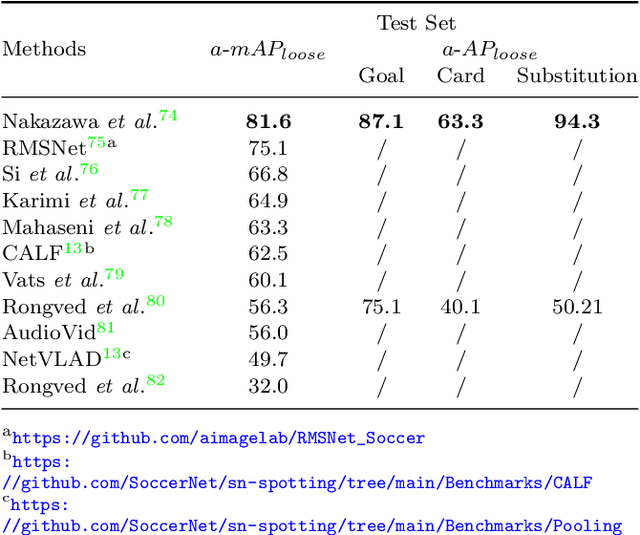Deep learning for action spotting in association football videos
Paper and Code
Oct 02, 2024



The task of action spotting consists in both identifying actions and precisely localizing them in time with a single timestamp in long, untrimmed video streams. Automatically extracting those actions is crucial for many sports applications, including sports analytics to produce extended statistics on game actions, coaching to provide support to video analysts, or fan engagement to automatically overlay content in the broadcast when specific actions occur. However, before 2018, no large-scale datasets for action spotting in sports were publicly available, which impeded benchmarking action spotting methods. In response, our team built the largest dataset and the most comprehensive benchmarks for sports video understanding, under the umbrella of SoccerNet. Particularly, our dataset contains a subset specifically dedicated to action spotting, called SoccerNet Action Spotting, containing more than 550 complete broadcast games annotated with almost all types of actions that can occur in a football game. This dataset is tailored to develop methods for automatic spotting of actions of interest, including deep learning approaches, by providing a large amount of manually annotated actions. To engage with the scientific community, the SoccerNet initiative organizes yearly challenges, during which participants from all around the world compete to achieve state-of-the-art performances. Thanks to our dataset and challenges, more than 60 methods were developed or published over the past five years, improving on the first baselines and making action spotting a viable option for the sports industry. This paper traces the history of action spotting in sports, from the creation of the task back in 2018, to the role it plays today in research and the sports industry.
 Add to Chrome
Add to Chrome Add to Firefox
Add to Firefox Add to Edge
Add to Edge